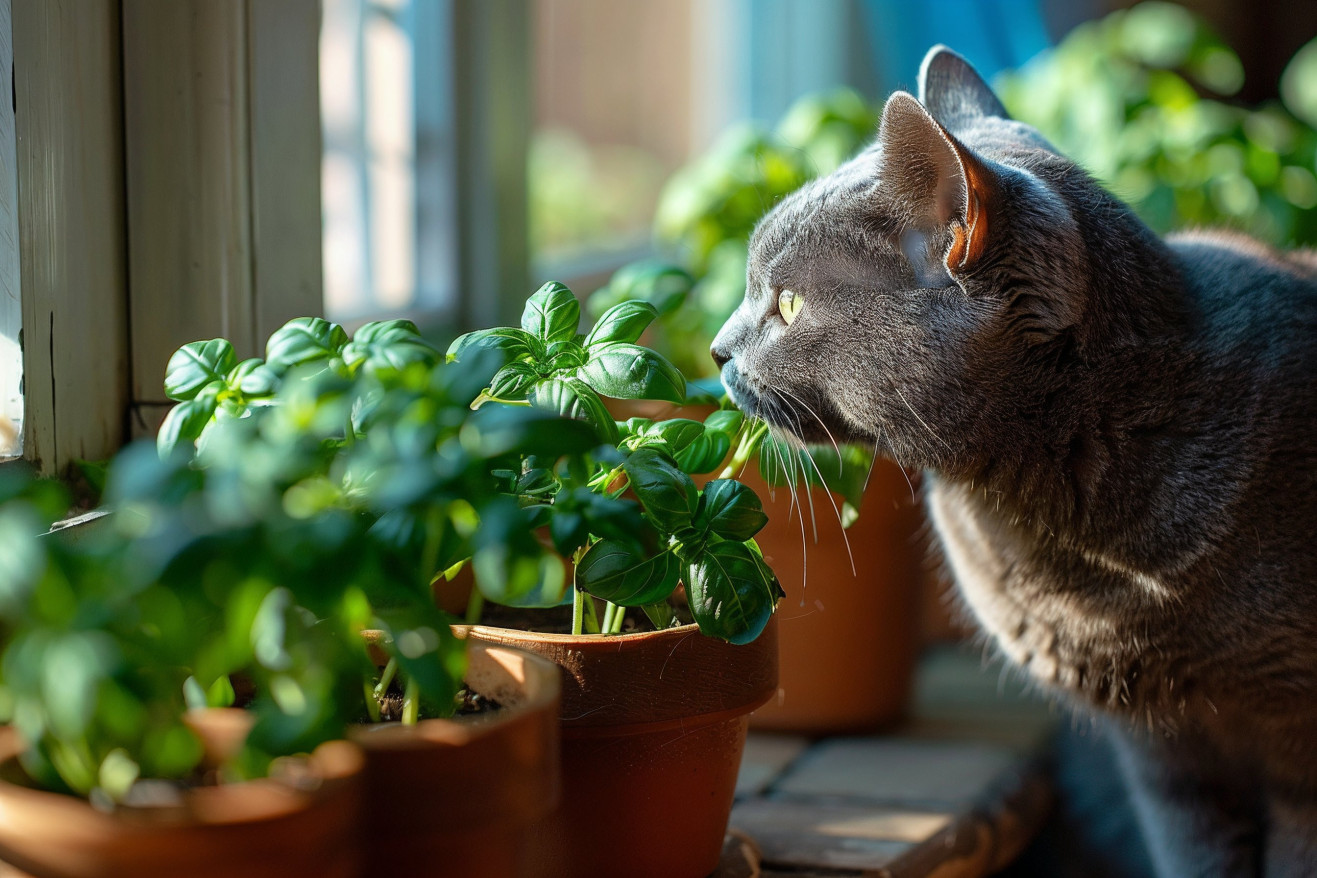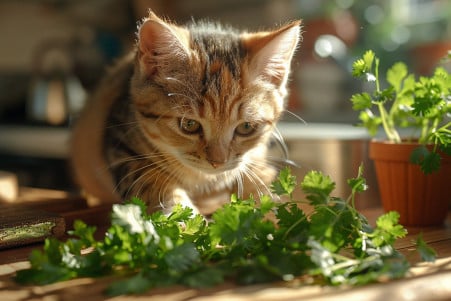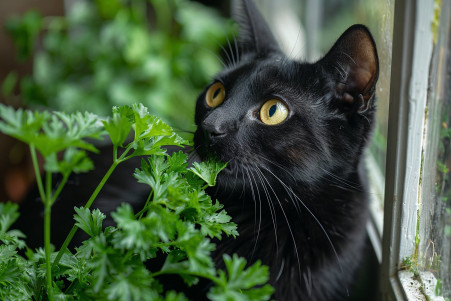Can Cats Eat Basil? Safe Herb Guidelines for Felines
3 March 2024 • Updated 2 March 2024

If you’re a cat parent, you may be interested in learning whether or not your furry friend can enjoy the fresh, fragrant taste of basil. The good news is that basil is non-toxic to cats, so it’s safe for them to eat in small amounts.
However, since basil doesn’t provide any nutritional value to obligate carnivores like cats, and since it can cause gastrointestinal issues in large amounts, there’s no reason to feed it to your cat. And, as we’ll discuss in more detail below, it’s important to never give your cat basil essential oil.
In this article, we’ll take a deep dive into the information provided by veterinarians and nutritional experts to help you understand how basil can affect your cat’s health. We’ll also look at information from animal nutrition studies and pet health organizations. Our goal is to give you the information you need to decide whether or not you want to add herbs like basil to your cat’s diet.
Can cats eat basil?
Cat Nutrition Basics: What Do Cats Eat?
Cats are obligate carnivores, which means that they have evolved to get their nutritional needs met through animal protein. According to the Cornell University College of Veterinary Medicine, a healthy diet for a cat is high in animal protein, moderate in fat, and low in carbohydrates. Cats’ nutritional requirements include essential amino acids, essential fatty acids, vitamins, and minerals, most of which are found in animal tissues.
On the other hand, plant-based ingredients like basil have little to no nutritional value for cats. While basil is not harmful and can be safely consumed in small amounts, it doesn’t offer the nutrients that cats need to be healthy. PetMD explains that cats need a diet high in animal protein to support their growth and maintenance, explaining that cats need 11 essential amino acids, all of which are most easily obtained from meat.
Feeding cats non-meat items can lead to digestive issues and nutritional deficiencies. The focus on animal-based ingredients isn’t just a preference for cats, it’s a biological necessity. This makes the addition of non-essential plant-based ingredients like basil more of a novelty than a benefit. This is important to keep in mind as we explore the potential effects of basil on cats.
In short, while basil is safe for cats, it doesn’t offer any health benefits. In fact, it’s not a necessary part of a cat’s diet at all. This is important to remember as we explore the potential effects of basil on cats.
Understanding How Basil Affects Cat Health
The ASPCA lists basil as safe for cats in small amounts, so it gets the go-ahead for feline consumption. Basil is not toxic on its own and is safe for cats in the Lamiaceae family, which includes catnip and mint. However, it’s important to use it in moderation. Excessive consumption of basil can lead to digestive upset in cats, including vomiting and diarrhea, according to Spruce Pets.
This is because cats have a hard time digesting plant material. Cats are obligate carnivores, which means they are designed to metabolize meat, not basil. In addition, a small percentage of cats may be allergic to basil, which can cause skin or respiratory issues, according to Cats.com, although this is rare.
The biggest warning goes to basil essential oil, which is an essential oil that contains synthetic phenols that are highly toxic to cats and can cause liver damage. Because of this, cat owners should never use basil essential oil, which is not safe for cats and is toxic to them, unlike the plant form.
Knowing this information can help cat owners make sure that they and their cats can coexist peacefully with their indoor herb gardens and help ensure that their cats have a well-rounded diet.
Finding Your Way Through the Herb Garden: Cat-Friendly Herbs and Preferences
While basil is an example of an herb that is safe for cats when consumed in moderation, it’s important to note that not all herbs are created equal in this regard.
Dutch.com explains that there are several herbs, including chives, garlic, and oregano, that are poisonous to cats and can lead to symptoms such as vomiting, diarrhea, and even organ damage. As a result, it’s important for every cat owner to be able to recognize and steer clear of these toxic herbs.
The way cats eat grass and other houseplants can be confusing to their owners. Vetstreet delves into a number of different theories that have been proposed to explain this behavior, which include the idea that it helps with the movement of food through the digestive tract, that it satisfies an innate desire for certain nutrients or fiber, and that it’s an instinctual way to rid the body of indigestible substances.
On the other hand, some cats may seek out specific herbs and plants due to curiosity or stress, which is known as displacement behavior. This self-soothing behavior may lead to the cat chewing on a plant as a way to calm themselves. Meanwhile, Pets Best points out that some cats may be attracted to certain plants due to the euphoric effect they produce, such as catnip.
To make sure that your cat is consuming herbs in a safe way, offer cat-friendly options like catnip or valerian, and make sure that any plant that your cat can reach is non-toxic.
Keep a close eye on your cat’s interactions with plants and talk to your vet before introducing any new herbs into your cat’s environment. Knowing which herbs are safe for your cat can help you create an environment that’s both enriching and safe.
How to Give Your Cat Basil
If you decide to give your cat basil as a treat, it’s important to do so in a way that’s safe and healthy for your pet. According to The Spruce Pets, a small amount of fresh basil is not toxic to cats.
That said, it’s important to remember that cats don’t need basil in their diet, so you should only give it to them in small amounts. Feeding your cat too much basil can cause digestive issues like vomiting and diarrhea.
Cats.com notes that while cats may like the smell of basil, they are primarily attracted to the smell of meat. As a result, if you want to give your cat basil, you should do so in moderation and watch for any signs of a bad reaction, especially if it’s the first time your cat has tried it.
While rare, cats can be allergic to basil, and an allergic reaction may cause hives or breathing problems.
It’s also important to never let basil replace any part of your cat’s regular diet. Cats are obligate carnivores, and they need to get the majority of their nutrients from animal protein. Always talk to your vet before giving your cat any new food to make sure it’s safe and healthy for them.
After all, part of being a good pet owner is making sure your cat gets a nutritionally complete diet that’s tailored to their specific needs. In this context, basil is best used as a treat.
Conclusion: Basil and Your Cat’s Well-Being
So, while basil is not poisonous and can be given to cats in small amounts, it’s not a big part of their diet. Cats are obligate carnivores, which means they need a diet that’s primarily made up of meat and includes all of the nutrients they need.
Both The Spruce Pets and Cats.com note that while basil is not toxic, it should be given in moderation to avoid stomach upset and allergic reactions.
When you’re adding new things like basil to your cat’s diet, make sure to do so carefully and watch for any signs of a bad reaction. And always remember that it’s important to use things in moderation and talk to your vet before making any changes to your pet’s diet to make sure they stay healthy and strong.
It’s important to be thoughtful about the things we feed our pets, and it’s also important to make sure we’re honoring our cats’ natural dietary needs. Let’s make sure we continue to feed our pets the right way and make sure we’re always putting their well-being first.


